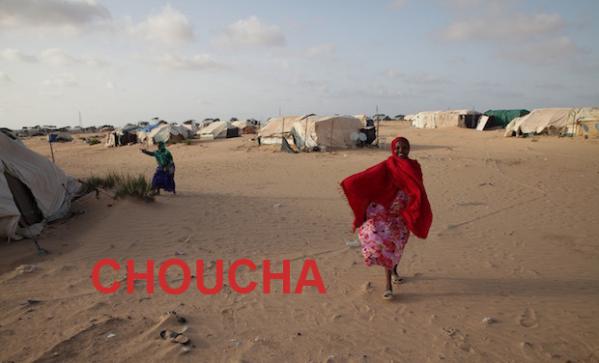Fiche Film
Cinéma/TV

MOYEN Métrage | 2015
Choucha, une insondable indifférence – شوشة

Titre original : Choucha, les oubliés de la guerre libyenne [Working title]
Pays concerné : Tunisie
Durée : 52 minutes
Genre : portrait
Type : documentaire
Français
Un camp au sud de la Tunisie, Choucha. Le désert.
Le 30 juin 2013, le camp ferme : l’eau, l’électricité sont coupées. Les ONG se retirent, plus de soins.
Pourtant 700 rescapés du conflit libyen, réfugiés sans pays d’accueil et déboutés de leur demande d’asile survivent dans ce lieu fantomatique depuis deux ans et demi. Refusant l’intégration locale suite à l’attaque du camp par un village voisin, leurs papiers ayant expirés, les familles sont prises au piège d’une situation kafkaïenne. Survivre au milieu du désert ou tenter l’improbable aventure maritime pour Lampédusa via la Libye ?
Leurs témoignages nous interrogent sur les stratégies mises en place pour aider et sécuriser les victimes des conflits actuels. Comment ce système, censé protéger, finit-il par exclure les plus vulnérables.
Réalisé par Sophie Bachelier et Djibril Diallo
Tunisie, 2015, Documentaire, 52 min – HD – Couleur
Pays de production : France
Réalisateurs : Sophie Bachelier, Djibril Diallo
Scénaristes : Sophie Bachelier, Djibril Diallo
Image : Sophie Bachelier
Son : Djibril Diallo
Montage : Sophie Bachelier
Montage : Djibril Diallo
Producteur délégué : DAMU et d’eau fraîche production
2015 | Lumières d’Afrique, Besançon, France – du 7 au 15 nov 2015
* Sélection – Documentaires en compétition
www.lumieresdafrique.com/documentaires-en-competition/1060-choucha-une-insondable-indifference.html
Le 30 juin 2013, le camp ferme : l’eau, l’électricité sont coupées. Les ONG se retirent, plus de soins.
Pourtant 700 rescapés du conflit libyen, réfugiés sans pays d’accueil et déboutés de leur demande d’asile survivent dans ce lieu fantomatique depuis deux ans et demi. Refusant l’intégration locale suite à l’attaque du camp par un village voisin, leurs papiers ayant expirés, les familles sont prises au piège d’une situation kafkaïenne. Survivre au milieu du désert ou tenter l’improbable aventure maritime pour Lampédusa via la Libye ?
Leurs témoignages nous interrogent sur les stratégies mises en place pour aider et sécuriser les victimes des conflits actuels. Comment ce système, censé protéger, finit-il par exclure les plus vulnérables.
Réalisé par Sophie Bachelier et Djibril Diallo
Tunisie, 2015, Documentaire, 52 min – HD – Couleur
Pays de production : France
Réalisateurs : Sophie Bachelier, Djibril Diallo
Scénaristes : Sophie Bachelier, Djibril Diallo
Image : Sophie Bachelier
Son : Djibril Diallo
Montage : Sophie Bachelier
Montage : Djibril Diallo
Producteur délégué : DAMU et d’eau fraîche production
2015 | Lumières d’Afrique, Besançon, France – du 7 au 15 nov 2015
* Sélection – Documentaires en compétition
www.lumieresdafrique.com/documentaires-en-competition/1060-choucha-une-insondable-indifference.html
English
A camp in southern Tunisia, Choucha. The desert.
On June 30th 2013 the camp closed : water and electricity were cut off. The Non-Governmental Organizations withdrew ; no more healthcare. Yet 700 escapees from the Libyan conflict, refugees with no country to go to, their requests for asylum rejected, have survived in that ghost place for two and a half years. Refusing to integrate into the locality following an attack on the camp, and their papers having expired, the families are trapped in a Kafkaesque situation. Should they try to survive in the middle of the desert, or attempt the dangerous sea journey to Lampedusa via Libya ?
Their testimonies make us question the strategies adopted
to help and protect the victims of current conflicts.
How is it that the system which is thought to protect them
ends up by excluding the most vulnerable ?
On June 30th 2013 the camp closed : water and electricity were cut off. The Non-Governmental Organizations withdrew ; no more healthcare. Yet 700 escapees from the Libyan conflict, refugees with no country to go to, their requests for asylum rejected, have survived in that ghost place for two and a half years. Refusing to integrate into the locality following an attack on the camp, and their papers having expired, the families are trapped in a Kafkaesque situation. Should they try to survive in the middle of the desert, or attempt the dangerous sea journey to Lampedusa via Libya ?
Their testimonies make us question the strategies adopted
to help and protect the victims of current conflicts.
How is it that the system which is thought to protect them
ends up by excluding the most vulnerable ?
Partager :



